new posts in all blogs
Viewing: Blog Posts Tagged with: lha, Most Recent at Top [Help]
Results 1 - 14 of 14
How to use this Page
You are viewing the most recent posts tagged with the words: lha in the JacketFlap blog reader. What is a tag? Think of a tag as a keyword or category label. Tags can both help you find posts on JacketFlap.com as well as provide an easy way for you to "remember" and classify posts for later recall. Try adding a tag yourself by clicking "Add a tag" below a post's header. Scroll down through the list of Recent Posts in the left column and click on a post title that sounds interesting. You can view all posts from a specific blog by clicking the Blog name in the right column, or you can click a 'More Posts from this Blog' link in any individual post.

By: Laurie Halse Anderson,
on 9/5/2012
Blog:
Mad Woman in the Forest
(
Login to Add to MyJacketFlap)
JacketFlap tags:
lha,
Add a tag
Originally published at Mad Woman in the Forest. Please leave any comments there.

Don’t know if you’ve heard the news, but Judy Blume has posted about her recent breast cancer surgery. You should hop over and read it right now. I’ll wait.
::files paperwork::
::ignores email::
You back? Good. Her blog post contains everything I love about her writing; honesty, clarity, humor and optimism.
A few YA-types were asked this morning to put together some of our thoughts about Judy; kind of a group hug and box of Kleenex (not that she needs it – we do) in the form of an article in the Atlantic wire. Judy is our hero for both helping us get through adolescence and leading us along the road to being good, responsible authors.
It was nice to say “Thank you.”

By: Laurie Halse Anderson,
on 8/31/2012
Blog:
Mad Woman in the Forest
(
Login to Add to MyJacketFlap)
JacketFlap tags:
lha,
Add a tag
Originally published at Mad Woman in the Forest. Please leave any comments there.
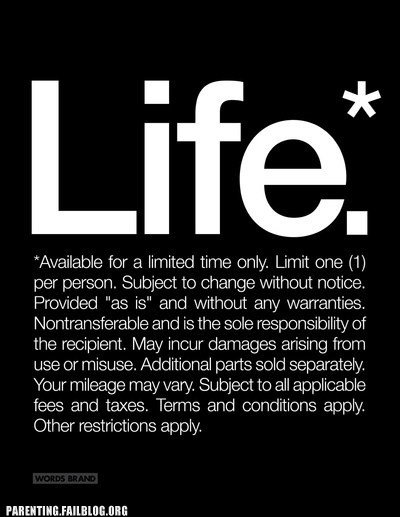
We’re here!!
The end of WFMAD, Year 5. How was it?
Writing this blog every day turned out to be good discipline for me. I have been a wretched excuse for a blogger in the past year. A blog post is an essay. I would rather work on my novels than write an essay several times a week. But I seem to have no problem posted to Twitter, or to Tumblr, or to Facebook. No essays required there, I guess.
It takes me an average of about four hours to write a WFMAD blog. (Now you know why it takes me so long to write a novel.) I deliberately did not review my previous WFMAD blogs, but I realize that I may have unintentionally replicated some topics. For those of you who have been following for five years, my apologies.
I’m not sure if I’m going to do this again next year because of exactly that issue; there are only so many things one can say about this bizarre little practice of dreaming up worlds and then committing them to paper. I’m thinking about writing a small e-book that would contain whatever it is I think I know about trying to combine life and writing. Not sure.
Would you rather see the e-book or will you be here in August 2013, waiting for the next blog entry?
What did I do this month? Good question.
Along with writing this blog, I’ve been working on my YA novel every day. And we welcomed our first grandchild into the world this month. And we almost finished the mammoth house renovation project that has consumed the past 18 months. And I went to a lot of doctors and I kept the gardens almost weed-free and took care of various and sundry matters for various and sundry relatives and friends. Took a quick trip to Montreal. Answered a lot of email. Read some great books. Watched Olympics. Ate astounding tomatoes.
Life happens whether you are writing or not. You don’t have to wait for the right time, or that Muse-blessed idea or a fellowship to a writing colony or a winning lottery ticket or anything. You just have to give yourself permission to take seriously your writing dream.
Do you dare?
Why the hell not?
Is it not better to to have tried – to have lived and loved and failed…. but laughed – than to never have lived at all?
You can do this. You have permission.
I double-dog-dare you.
Today’s Quote
“Stories may well be lies, but they are good lies that say true things, and which can sometimes pay the rent.”
Neil Gaiman
Today’s prompt: How many days did you write this month? What happened to take you off track? How did you feel about that? What did you do the next day to change things? Looking at the next four months, what time of day is the best time for your to write? (You only need fifteen minutes! Write on the toilet, for cripes sakes!) What writing project do you want to finish before August 1, 2013?
Scribble…scribble…scribble…

By: Laurie Halse Anderson,
on 8/30/2012
Blog:
Mad Woman in the Forest
(
Login to Add to MyJacketFlap)
JacketFlap tags:
lha,
Add a tag
Originally published at Mad Woman in the Forest. Please leave any comments there.
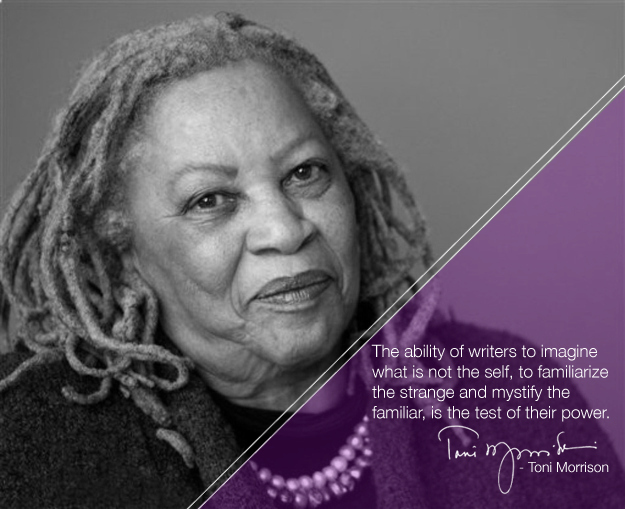
Google Analytics tells me that this blog is read by people all over the world. Hello, Egypt! Hello, Germany! Hello, Brasil!
Today I am going to focus on an issue central to life in the United States, so I beg forgiveness of those readers who don’t live here. I would, of course, love their opinions about this post, because I imagine their perspective on what I’m about to say would be fascinating.
Ready?
A lot of white people in the US don’t know they’re white. They think they just are, they think they are the default setting.
Am I talking about you? Might be. Are you white? Do you realize how relatively easy your life has been when compared to people from non-Caucasian backgrounds? Do you understand the phrase “white privilege?”
If the answer to that last question is “not sure or “no,” do yourself a favor and read this classic essay by Peggy McIntosh.
White people have had a whole lot of blood on their hands for the last four hundred years. It is not my intent to address that right now. I want to focus on storytelling. Specifically, white writers writing outside their (dominant) culture.
This brings up the larger question: whose story can you tell?
How should we write about people whose experience is different than ours? Is it appropriate to write from the perspective of a different gender, a different sexual orientation? What about religion? What about age? What about someone from a different ethnic background or culture or country?
I believe the answer is yes.
I believe that artists are called to be humble and lower their own sense of self so that they can be open to the experience of others and transform that into their art.
I believe that artists are called to lead the culture, not to wait until it’s safe to take a stand.
I’ve written from the male perspective (Twisted, Forge), from the African-American perspective during the American Revolution (Chains, Forge), and about children in different countries (a non-fiction book about Saudi Arabia, and my first picture book, Ndito Runs, about a Kenyan girl).
I was criticized by both white and black Americans for Chains and Forge, though not as much as I thought I’d be. The criticism from some white people has been along the lines of “Why do you have to write about that slavery stuff? That was over a long time ago. We’ll never move the country forward if people like you keep bringing it up.” The criticism from a few black people was that these are not my stories to tell.
The reason America struggles so much with the evil of racism is that we’ve never had the courage to study the history of our slavery and deal with its legacy. I’m the Queen Of The Elephant in the Room, folks. I’m going to keep on talking and writing about things that make us uncomfortable.
There is not much I can say to change the opinion of people who think that I shouldn’t write from a slave’s POV because I’m white. No doubt there is a long and painful history behind that opinion. White people have been stealing stories (and music, and dance, and etc.) for as long as we’ve been stealing peoples and nations. I respect that opinion, but I disagree with it. I thought and prayed a long time before I wrote those two books. I spoke to friends and educators of all backgrounds trying to figure out if and how I could write from the perspective of Colonial-era slaves.
I decided, in the end, that it was my story, too. Slavery is not only an African-American experience. Slavery is an American experience. If I, a middle class white female writer, with all the privileges that entails, could not find a way into the hearts and souls of Isabel and Curzon, then there could be no hope for my country. But to do the job well and responsibly, I had to research the topic like no one ever had before, and then have historians comb over my manuscript to make sure I got it right.
Researching the experiences of other people means checking your assumptions at the door. You need to seek out primary sources that were composed and controlled by the people you seek. You must study the broader world of your character so that when you come across “facts” you can analyze them within the context of their time and space, and with a critical view toward the source of the data. You have to be willing to approach people who know more than you do and ask for their guidance and help. And you must listen to them.
We read to understand people whose lives are different than our own. Some writers will feel called to write about people who are unlike themselves.
You can do it, but you must do it with humility, respect, and a lot more research than you realize.
There are two bloggers you simply must read if you are thinking about writing characters from non-white backgrounds. The first is Debbie Reese, who is tribally enrolled at Nambe Pueblo. A former professor in American Indian Studies, Debbie is currently working on a Master’s Degree in Library and Information Science with the goal of establishing a library and tribal archive at Nambe. Her wonderful blog, American Indians in Children’s Literature looks at the way Native Americans are portrayed and represented in children’s literature.
Debbie writes: “Though I am certain that no author ever sets out to deliberately misrepresent who we are in his or her writing, it happens over and over again. Information is the only way to counter those misrepresentations. On American Indians in Children’s Literature, I publish analyses of children’s books, lesson plans, films, and other items related to the topic of American Indians and/or how we this topic is taught in school. “
Her blog is a wealth of information. To start, check out “Authenticity and Sensitivity: Goals for writing and reviewing books with Native American themes,” which she wrote for School Library Journal.
Thank you, Debbie, for encouraging me to write about this topic today!
The other blogger is my friend and wonderful author, Mitali Perkins. You should be reading her blog anyway, if you want to publish for children. But her posts Ten Tips About Writing Race In Novels and her “writing race checklist” are very good tools.
Sci-fi and fantasy author Nisi Shawl has a great post, Transracial Writing for the Sincere. And the almighty and ever-amazing Cynthia Leitich Smith (yes, she of one of the best children’s literature websites out there) wrote an “It’s Complicated” post about writing outside your culture.
I suspect I’ll be writing more about this once WFMAD is over, but this is a good start to an important and complex topic. http://madwomanintheforest.com/If you know of other websites or resources that would be helpful for folks looking to write outside their own experience, please let me know in the comments section.
Today’s Quote
“You just keep the words coming. No trick to it at all if the writing is in you. Nothing will come if you haven’t got the stuff. It comes natural or it doesn’t come at all. Everything comes; the people, the place, the story, and you just act like the fella feeding the corn shucker. Keep moving about and filling.”
William Faulkner
Today’s prompt: What kind of character would you feel completely unable to write about? Why? List five things that would start you on the path to understanding that character well enough to start writing.
Scribble…scribble…scribble…

By: Laurie Halse Anderson,
on 8/24/2012
Blog:
Mad Woman in the Forest
(
Login to Add to MyJacketFlap)
JacketFlap tags:
lha,
Add a tag
Originally published at Mad Woman in the Forest. Please leave any comments there.
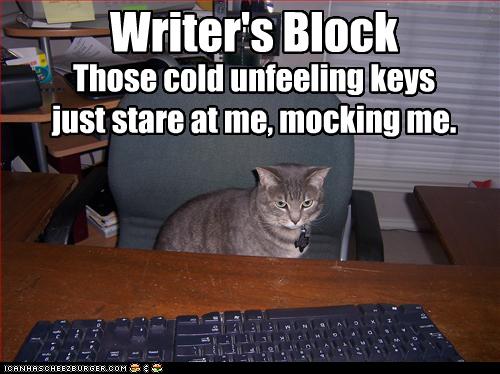
If you’ve never had writer’s block, go away.
If you’ve never had writer’s block, you should be writing this blog.
If you say you’ve never had writer’s block, I don’t believe you.
Writer’s block is actually several conditions masquerading as one. Saying, “Help me, I have writer’s block” is as useful as going to your doctor and saying, “I feel icky.”
You must figure out what kind of writer’s block you have in order to cure yourself.
Blank Screen Writer’s Block, Type 1 – You stare at the screen or the empty page and you cannot think of a single thing to write. You want to write, but you have no ideas or words.
Blank Screen Writer’s Block, Type 2 – You stare at the screen or the empty page and you are so overwhelmed by ideas and words that you don’t know where to start.
Ticking Clock Writer’s Block – You put off starting a project and now the deadline looms and you are paralyzed.
Hysterical Monkeys Writer’s Block – Tribes of hysterical monkeys inhabit your brain, screaming about what a crappy writer you are. This, understandably, makes it hard to write anything.
Obsessive Compulsive Writer’s Block – Whenever you sit down to write, you are seized by the uncontrollable urge to clean your oven, scrub your roof shingles, or alphabetize the entire Internet on a hand-crocheted doily that you will then use as the signature item in the Etsy store that you’re going to open in time for the holiday sales rush. You forget about your novel until your writing time is up and you snap out of your fugue state.
The first cure is a simple one. Step away from the desk and go for a long walk. Or a run. Or swim. Something that will warm the muscles and cool your fevered brain. You might want to carry a scrap of paper and pencil with you (not in the pool) in case a line or two pops up. Regular exercise is an under-appreciated part of the writing process.
If you are suffering from Blank Screen Writer’s Block, Type 1 or 2, grab a book off your shelf. Any book that you enjoyed will do, though I prefer poetry for this remedy. You can also use the Poetry Foundation’s browsing function or mobile app. Copy a few lines from a poem or a novel and then treat those lines as a prompt and freewrite from them. (Do not use those borrowed lines in your novel; that would be called “stealing.” Use them to kindle your imagination only.)
Ticking Clock Writers Block can be cured by telling your editor or professor or whomever that you are going to be late, or by pulling up your big-girl pants and recognizing that fretting about how much time you don’t have is actually a way of creating drama in your brain so you don’t have to deal with the real issue; what is the next sentence you are going to write.
Hysterical Monkeys Writer’s Block is best dealt with by picking up all the monkey shit they are throwing at you and fling it back in their faces. Write on an index card in large letters, “CHILL OUT. IT’S ONLY A DRAFT.” and post it just above your screen. Be sure to preserve the first draft of your novel so that you can compare it to the final draft. That will shut up those dumb monkeys.
Obsessive Compulsive Writer’s Block is kind of magical. Recognize what you are doing and why, and then very quietly sit down with paper and pen. Write a list of all of the things that you could do when you are in this mindset, from braiding your nose hair to teaching the cat how to operate the coffee maker. The list can contain up to 4,000 items. Then list five things that you want to do for your story, like brainstorm character names, decide on a setting for one chapter, or writing a short bit of dialog between Character A and Character B. The trick is to give yourself a small, manageable task and ease into the writing.
There are several other small variants of writer’s block, but I don’t want to discuss them publicly until I finish my quantitative analysis on them. In fact, I might make this the topic of my dissertation, and then I can submit papers to pompous academic journals and maybe I’ll be invited to present at the Pompous Academic Writing Forum next year in Mongolia, and I should look up how much it costs to fly to Ulaanbaatar and…..
Or I could just sit down and write.
Yeah, that’s what I really want to do.
PS – For another author’s take on the whole “To MFA or not to MFA” question, read Maureen Johnson’s blog.
Today’s Quote
“If you get stuck, get away from your desk. Take a walk, take a bath, go to sleep, make a pie, draw, listen to music, meditate, exercise; whatever you do, don’t just stick there scowling at the problem. But don’t make telephone calls or go to a party; if you do, other people’s words will pour in where your lost words should be. Open a gap for them, create a space. Be patient.”
Hilary Mantel
Today’s prompt: Write a letter to your writer’s block. Describe how it works and how you really feel about it. Then serve it with eviction papers and write out precisely what you are going to do the next time it kicks in.
Scribble… scribble… scribble…

By: Laurie Halse Anderson,
on 8/22/2012
Blog:
Mad Woman in the Forest
(
Login to Add to MyJacketFlap)
JacketFlap tags:
lha,
Add a tag
Originally published at Mad Woman in the Forest. Please leave any comments there.
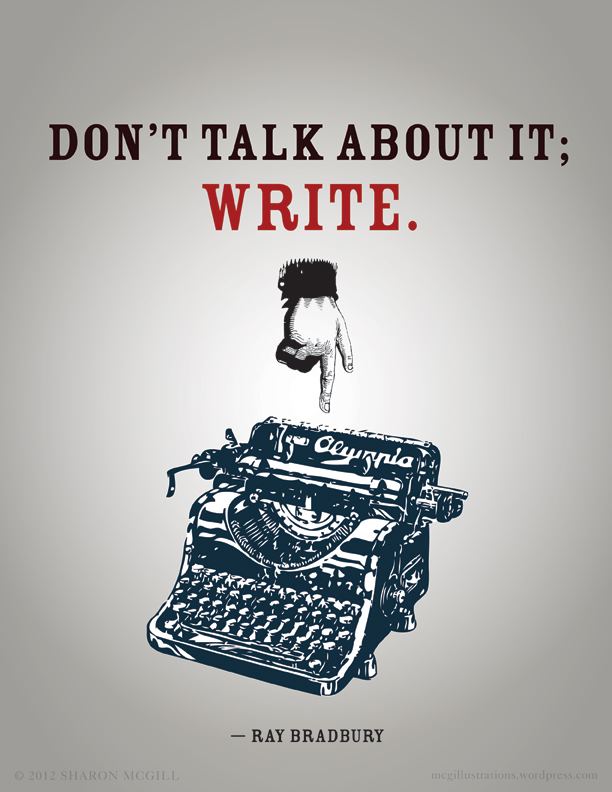
I was once on a panel with the amazing and wonderful Walter Dean Myers, who is serving now as our National Ambassador for Young People’s Literature. (I mostly sat quietly and absorbed everything he had to say.) Walter was asked about the amount of competition and jealousy among those of us who write for kids and teens.
“We are not competitors,” he said. “We are co-conspirators. We support and encourage each other so we can make the very best books for our readers.”
This is a common sentiment among the authors that I know. It may help explain why so many children’s authors have critique groups or critique partners who are also children’s authors.
It can be a challenge to find the right critique group. I went through several when I was starting out, trying to find people whose approach to the work was similar to mine, and whose opinions I could trust. I tried a couple of groups in which I was the only person writing for kids. That was a nightmare. I had a critique partner for a couple of years who eventually soured on the business aspects of writing and gave up her writing. I finally found an amazing group that met once a month for an entire day. I worked with them for almost ten years until I moved out of the area. Since I live in the boondocks and travel so much, it’s been hard to be a regular attender at the great group I found up here. I trade manuscripts with a few trusted writer friends and get feedback that way.
If you write for kids or teens and you are in search of critique partners, your local SCBWI (Society of Children’s Books Writers & Illustrators) will be able to help you. (If you don’t belong already, join SCBWI. It will be the best money you spend all year.)
Critiquing friends and other co-conspirators are not just there to point out the holes in your plot. They’ll support you as you support them through the ups and downs of the creative journey. Writing is a solitary craft. Making sure that you have people in your life who respect and understand your work is vital.
Today’s Quote
“Friendship is born at that moment when one person says to another: “What! You too? I thought I was the only one.”
C.S. Lewis, who was in a critique group with J.R.R. Tolkien, Charles Williams, and others
Today’s prompt: Write about a time when you worked on a creative project with a friend. See if you can go back to your childhood for this.
Bonus points – if you don’t have a critique group or a critique partner, start the search for one today.
Scribble… scribble… scribble…

By: Laurie Halse Anderson,
on 8/20/2012
Blog:
Mad Woman in the Forest
(
Login to Add to MyJacketFlap)
JacketFlap tags:
lha,
Add a tag
Originally published at Mad Woman in the Forest. Please leave any comments there.
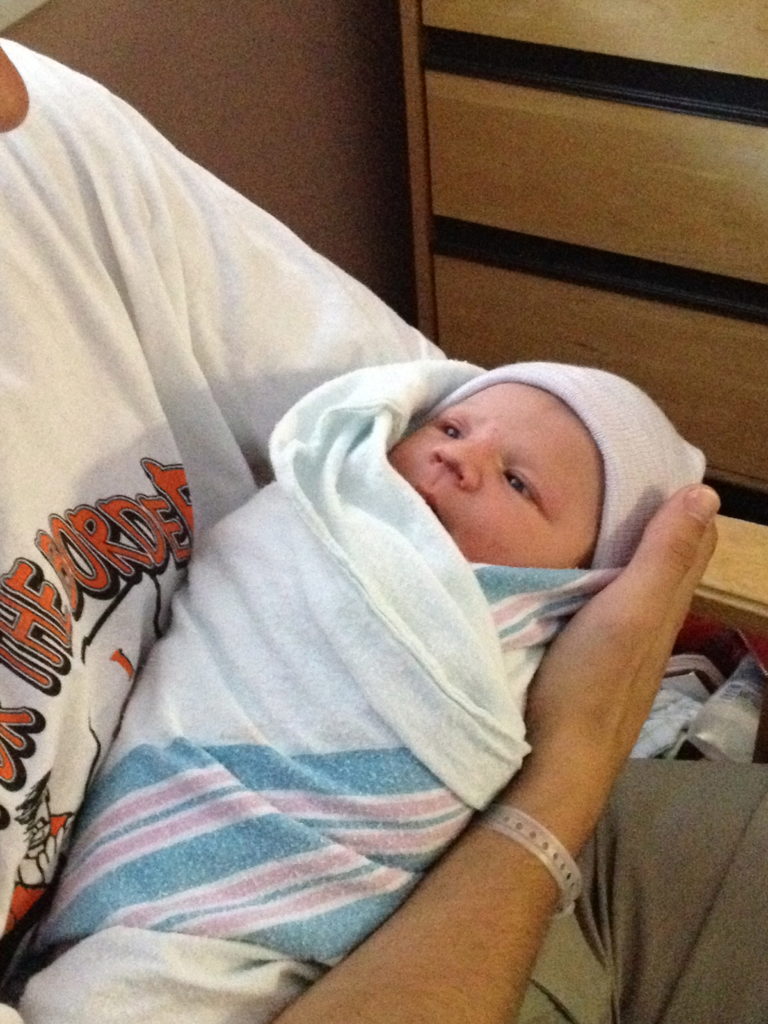
That adorable baby in the photo is our first grandchild, born yesterday afternoon. Welcome to the world, Logan!!
It’s a good thing I got in about five hours of writing yesterday morning, because from the time we left for the hospital, my head has been a total muddle.
What do you do about your writing when life throws you a curveball? The entrance of a grandchild is a glorious, positive thing, but it does distract a bit from my intensity and focus on my novel. Getting bad news; a car accident, illness, death of a loved one, are even more distracting. If you are taken away from your project, it often feels impossible to find your way back into it.
First things first – give the people you love the time and attention they deserve. If you are caring for a sick child, or a terminally ill parent, that’s where your energy and heart goes. If it’s a joyful distraction, like a new baby, same thing, though in my experience, it’s easier to stay connected to creative work during the happy times than the sad.
That being said, try to keep a window into your creative soul open. You might hear lines of poetry in your head. Drawing might soothe you. If you have enough concentration, look at a small piece of your work-in-progress. Just a chapter, or maybe a scene. Polish it; add some detail, trim the dialog, make sure your transitions are solid. The key is to stay connected with your work in a small and consistent manner.
Today’s Quote
“The one thing that you have that nobody else has is you. Your voice, your mind, your story, your vision. So write and draw and build and play and dance and live as only you can.”
Neil Gaiman
Today’s prompt: Look at the photo of a newborn (say, for example, that incredibly handsome and intelligent fellow above) and write a list of possibilities for his life. Instead of the “what ifs” you’re writing “what could bes.”
Then take a baby photo of someone you know well, someone whose life story you are familiar with. Pick one or two of the possibilities you already listed, and freewrite about how that possibility did or did not develop for the person you know. Don’t feel compelled to stick to the facts at hand; if your imagination takes off and invents a fictional character, run with it.
Scribble… scribble… scribble…

By: Laurie Halse Anderson,
on 8/19/2012
Blog:
Mad Woman in the Forest
(
Login to Add to MyJacketFlap)
JacketFlap tags:
lha,
Add a tag
Originally published at Mad Woman in the Forest. Please leave any comments there.

So I promised that I would talk about money today.
Such a depressing topic.
It’s not that money is evil. In fact, it’s rather lovely, especially when your children are hungry, or they have outgrown their sneakers for the third time in a year or they want to live in something other than a tent, especially when it snows.
But money, as Mother was so very fond of pointing out, does not grow on trees.
So you get a real job to earn money. That takes about 40 hours a week. Plus commuting time. And if you have family, they take up an addition 100,000 hours a week. And then you have to make time for things like dentist appointments, getting the car inspected, taking the hamsters to the vet, etc.
And then you have to make time for writing. Right?
Many people (like me) feel that if they could just get their novel published, it would be the end to their money woes. So in addition to all the creative pressures they feel when writing, they add financial pressure. And then? And then? Some people shoulder even more burdens. They hope that the novel they’re writing will let them get a divorce, it will stop the bank from foreclosing, it will cure their smelly feet, it will make a lost love return to their arms.
Those kinds of expectations will destroy your writing and break your heart.
This post does a pretty good job explaining the math of publishing. It is rather dreary. If you prefer to focus on the success stories of J.K. Rowling and Stephenie Meyer, go ahead. I don’t blame you.
Looking at my experience and that of other writers I know who are making a living and paying the bills from writing, this is how you can get there.
1. Write a great book.
2. Get an agent to represent you.
3. The agent sells the book to a publisher.
4. You celebrate, but you don’t quit your day job.
5. Over the next decade, write and sell five more books.
6. And sneak in whatever kind of publicity you can in your free time so that…
7. All of your books earn out their advances and you have a steady royalty stream.
8. Calculate how you’re going to pay for health insurance.
9. Decide to keep the day job a while longer
10. After 15 years and 8 or 9 books, take a deep breath and quit the day job.
(Note: if your significant other has a great job, you obviously have more flexibility.)
Are you still with me? Still want to be a writer?
Now that you know the icky part, what questions do you have about the money and publication side of things?
Today’s quote
“The arts are not a way of making a living. They are a very human way of making life more bearable. Practicing an art, no matter how well or badly, is a way to make your soul grow, for heaven’s sake. Sing in the shower. Dance to the radio. Tell stories. Write a poem to a friend, even a lousy poem. Do it as well as you possibly can. You will get an enormous reward. You will have created something.”
Kurt Vonnegut
Today’s prompt: Write your success story, the People magazine version, about how your novel is going to put you in the ranks of J.K. Rowling and Stephenie Meyer. Be sure to include the wording of the note that you’re going to send me when you prove this blog post completely wrong!
Scribble… scribble… scribble…

By: Laurie Halse Anderson,
on 8/18/2012
Blog:
Mad Woman in the Forest
(
Login to Add to MyJacketFlap)
JacketFlap tags:
lha,
Add a tag
Originally published at Mad Woman in the Forest. Please leave any comments there.

This picture? Elephant playing in waterfall? This should be you writing.
No, that is not an unkind remark about the way you look in those pants. I am not implying that your life is that of a caged animal forced to entertain strangers and attend to all bodily functions in front of a crowd that throws peanuts.
I am pointing out that many writers get caught in the “tortured artist” mindset. And if you are a product of the American work ethic (i.e. you don’t feel like a good person unless you are working, nose to the grindstone eighty hours a week), then you are likely to slip into a frame of mind in which you regard writing as laborious, exhausting, work.
This is compounded by the neurotic tendencies many of us have about the quality of our work, and made even gloomier if you are hoping that what you are writing might one day pay the bills.
Sound familiar?
I’m not judging. I recognize this behavior because I fall into it all the time (as do my closest writer friends, who shall remain nameless because I love them).
The trick is to be aware when you stumble into the Bad Attitude Sewer Hole.
If the act of writing is not its own reward then why bother? Life is short, you’re going to die, the world is full of beauty and adventures. There are about a gazillion things that you could be doing with your writing time that would be fun and rewarding.
The next time you find yourself acting like a dramatic third-grader flinging herself on the couch, back of hand to her forehead, moaning about how hard it is to be a third grader and nobody understands and she hates doing it and she wishes third grade would just be finished magically and she needs a piece of chocolate cake now or she is going to faint…. stop.
Creating is fun. It’s a blast. Exercising our boundless imaginations feels magnificent. It changes our reality and strengthens us.
Yes, there is much about the publication process that is discouraging. (I’m going to talk about the whole Money Thing tomorrow.) Yes, it takes longer than you want to write a novel and it is confusing trying to keep all those pesky chapters straight.
But you are playing. It’s OK to enjoy writing. If you do, the chances you’ll make time for it everyday increase dramatically.
Today’s Quote
“Writing gives me such enormous pleasure, and I’m a much happier (and therefore nicer) person when I’m doing it. There’s a place in my head that I go to when I write and it’s so rich and unexpected – and scary sometimes – but never ever dull.”
Julie Myerson
Today’s Prompt: Think of the most duty-bound or boring person you know. (Or make one up.) Think of an incident that will snap that person out of her daily drudgery and recognize that there is more to life than working and having folded sheets in the linen closet. Write the scene that changes this character’s life.
Scribble… scribble… scribble…

By: Laurie Halse Anderson,
on 8/17/2012
Blog:
Mad Woman in the Forest
(
Login to Add to MyJacketFlap)
JacketFlap tags:
lha,
Add a tag
Originally published at Mad Woman in the Forest. Please leave any comments there.

In 1992 I was a stay-at-home mom with a 5- and a 7-year-old. I worked part-time as a freelance journalist, writing for magazines and the Philadelphia Inquirer newspaper. And I watched a LOT of the The Oprah Winfrey Show. It had been a lifeline to sanity from the days when I had a newborn and a toddler who resisted toilet training. It gave me a sense of community. It reminded me to read. It nudged me along my spiritual path. I adored it.
My life as an author began on September 7, 1992. (I’ll post more about that red-letter day in a few weeks. Probably on September 7.) That was the day I put my youngest daughter on the bus to first grade. That was the day I committed myself to becoming an author.
I kept writing for the newspaper, but I began to tell people that I was trying to become a children’s author. Most people would look at me with the kind light of pity in their eyes and say, “But don’t you want to write a real book?”
(In their pointy heads, real = for grown-ups.)
I made every mistake a wanna be writer could make. I sent out first drafts. I wrote what I thought would be published instead of what was in my heart. I collected hundreds of well-deserved rejection letters, until finally, FINALLY, I got The First Phone Call from an editor saying that Henry Holt want to publish a picture book of mine. That book, Ndito Runs, came out in 1996.
Most people looked at me with the kind light of pity in their eyes and said, “That’s nice, but when are you going to write a real book?”
My mother-in-law, Anastasia, never did. She said, “I bet you’re going to be on the Oprah Show. She likes all kinds of books!”
In 1999, Speak was published and named as a National Book Award Finalist. That was also the year that Oprah Winfrey was awarded the National Book Foundation’s 50th Anniversary Gold Medal in recognition of her efforts to promote reading. I saw Oprah across the room at the cocktail party for the authors before the dinner. I was too chicken to do anything more than steal glances and admire her shoes. (She looked amazing.)
I knew that I’d never have a book featured on Oprah’s show, though I will admit I’d fantasize about it. I kept writing and writing and eventually I was getting more contracts than rejection letters. Anastasia’s faith in both Oprah and me never wavered, not even when I divorced her son. (One of the most peaceful divorces in the world, btw. That’s also a post for another day.)
Well, Anastasia, the day you told me would come is here.
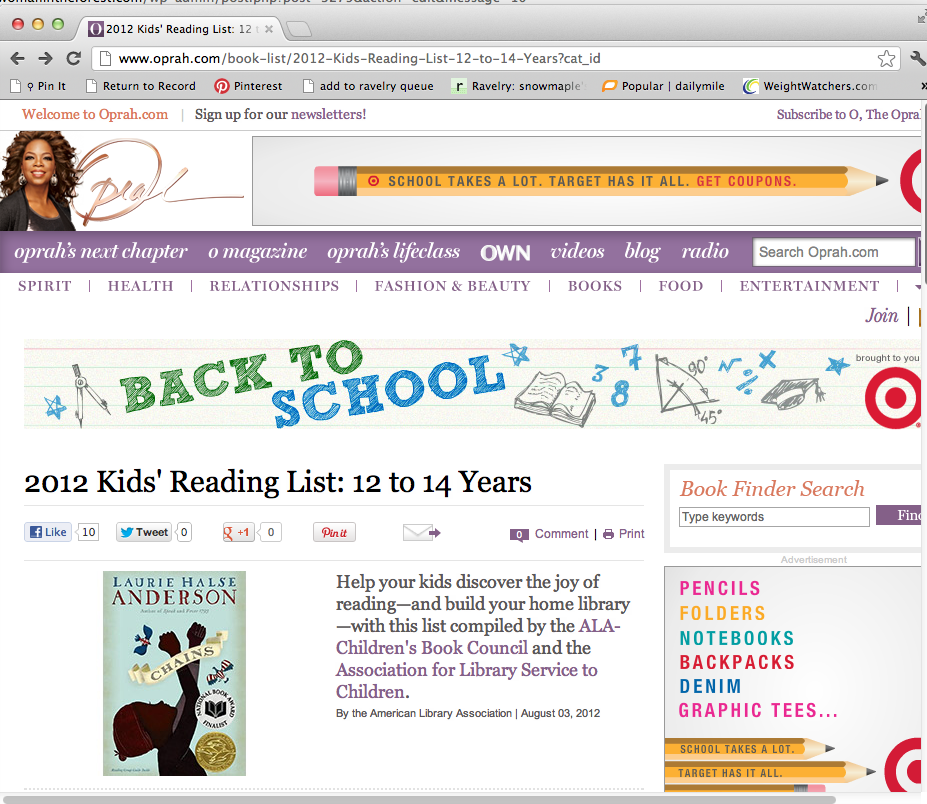
(Excuse me for a moment while I get up and dance wildly around the house again!!!)
There are many other wonderful books on the list, too, so be sure to check out all of them. Haven’t read Chains, yet? Then read this new review.
I lift my mug of tea and salute Anastasia and Oprah for two decades of encouragement and support! Thank you!

This extremely glamourous photo is of me and Anastasia the morning of my daughter Meredith’s wedding a few months ago.
Today’s Quote
“The biggest adventure you can ever take is to live the life of your dreams.”
Oprah Winfrey
Today’s Prompt: Write down this date: August 17, 2032. How old will you be? Next, jot down five of your writing dreams. Pick the most outrageous of those five dreams and write a paragraph or two – from the perspective of August 17, 2032 – and describe how that dream came to life. Then list the three things you can do TODAY to bring yourself one step closer to that dream.
If you haven’t talked to your mother-in-law recently, give her a call or send up a prayer to her today.
Scribble… scribble… scribble…

By: Laurie Halse Anderson,
on 8/16/2012
Blog:
Mad Woman in the Forest
(
Login to Add to MyJacketFlap)
JacketFlap tags:
lha,
Add a tag
Originally published at Mad Woman in the Forest. Please leave any comments there.
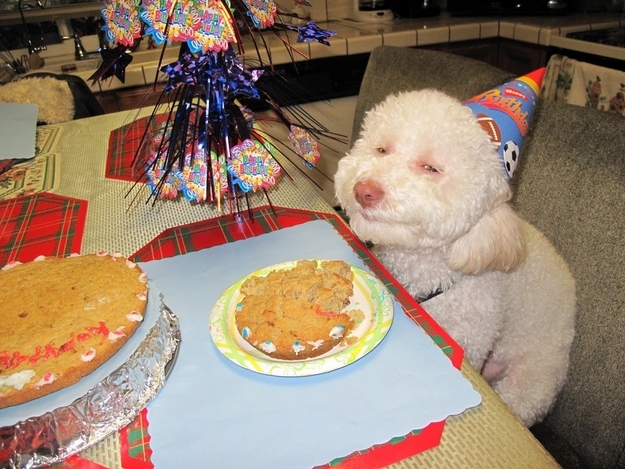
(OMG, don’t you want to be the dog in this picture????)
Several of you wrote to me yesterday and said how inspirational you found Jackie Woodson’s quote. I thought you would really appreciate something she tweeted late in the day: “My book is falling apart. I should keep writing but grabbing a towel & heading down to the water. Maybe the answer will ebb in with the tide.”
Perfect, isn’t it?
Even more perfect than you might realize because I’d been struggling with that feeling for about five days until late on Tuesday when finally, FINALLY, the line that totally helped me understand abo-so-freaking-everything about a critical character in my novel showed up.
(I felt just like the dog in the pic above! I tweeted my reaction: “Sometimes, after plugging away at a story for months or years, the perfect line drops into your lap. That line is a gift.”)
What’s the lesson here, besides the observation that tired, desperate authors vent on Twitter?
Writing a novel is never pain-free. In fact, I’d venture to say that most, if not nearly all, of the time you are writing a novel, you’re going to feel like crap. You have to find a way to simultaneously a) feel like a stupid, arrogant idiot who can’t write anything that is good enough to put on the bottom of a bird cage and b) believe in your dream and your talent and your vision of the story.
The secret is perserverance.
You muddle through the muck and keeping revising and eventually the story becomes less crappy. Marginally so, but you take strength from any source, right? As Jackie pointed out in yesterday’s quote, most people get to that awful hellhole, that spot where they have lots of pages filled with tangled plot lines and confusing characters and they become overwhelmed by the crappiness of it all so they bury the manuscript – and the dream – in a box, and tell their friends that really, they always wanted to learn how to play the glockenspiel much more than they wanted to publish their book.
I’m not judging here. To count the number of times I wanted to do that, multiply 365 days by twenty years. Seriously.
I think the reason I wound up with a career as an author is that I have a vivid imagination and I am epically stubborn. Every time I wanted to quit, the part of me that punched the boy from across the street when he teased my little sister rises to the surface. I. Don’t. Back. Down. Not from bullies, not from stupendously dreadful drafts, not from nothin’.
Make peace with the fact that you are uncomfortable with the quality of your work for most of the writing process. Take the energy you used to waste being afraid that your writing sucked, and apply it to making your writing sing.
Today’s Quote
“The unreal is more powerful than the real. Because nothing is as perfect as you can imagine it. Because its only intangible ideas, concepts, beliefs, fantasies that last. Stone crumbles. Wood rots. People, well, they die. But things as fragile as a thought, a dream, a legend, they can go on and on. If you can change the way people think. The way they see themselves. The way they see the world. You can change the way people live their lives. That’s the only lasting thing you can create.”
Chuck Palahniuk
Today’s Prompt: As fast as you can, write a list of all the things you have learned in your life. Do NOT be philosophical or abstract. “You can’t change other people” won’t cut it for this exercise. “Don’t eat spinach at a business lunch because it’s hard to tell if it’s stuck in your teeth” does.
Bonus: Write a story about you or a character learning one of these lessons, or doing the opposite of the piece of advice.
Scribble… scribble… scribble…

By: Laurie Halse Anderson,
on 8/14/2012
Blog:
Mad Woman in the Forest
(
Login to Add to MyJacketFlap)
JacketFlap tags:
lha,
Add a tag
Originally published at Mad Woman in the Forest. Please leave any comments there.
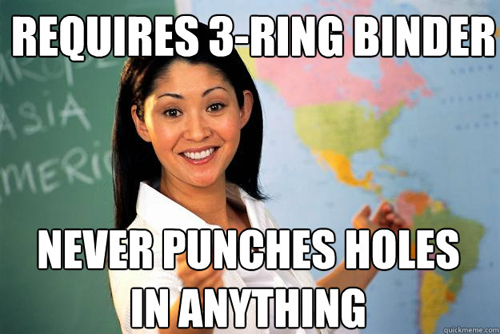
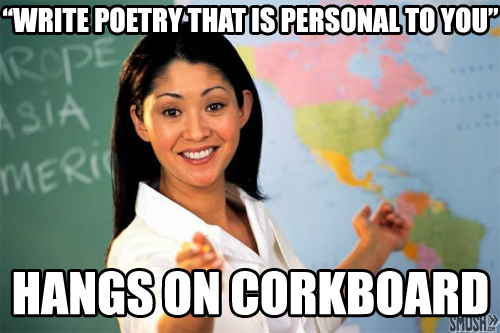
Thanks to everyone who participated in the discussion about the NPR’s Top 100 YA List. The good thing about lists and awards is that they tend to provoke conversation – sometimes debate – and in that way the titles of many more books are shared. And that’s a good thing.
But I really hope NPR follows up with some good journalism about YA and children’s literature by people of color as part of their attempt to report about and for a larger audience. Let’s keep bugging them about that, shall we?
Question 5: How do you begin a story when you have numerous ideas circling around in your brain?
Answer 5: It does not matter. JUST START. Write them all down, every single one. Scribble down the ideas on a sidewalk with chalk. Then take a photo before it rains. Or open a doc on your computer or grab a pen and a piece of paper. It does not matter. JUST START. The ideas don’t have to be in order. They do not have to be complete sentences. You’ll probably find that as you scribble, they will grow, mutate, and give birth to new ideas. This is good!!!
When you have captured all the ideas buzzing around in your brain, take a day or so away from them. Let them cool down. Come to my house and help me weed my gardens while you’re waiting. Then go back and read them. Circle the ones that make your heart beat faster. Those are the ideas that you should be pursuing right now.
Today’s Quote
“Never be afraid to sit awhile and think.”
Lorraine Hansberry
Today’s Prompt: I want you to think about someone that you went to high school with. It should be someone you’d say “hi” to in the halls, but not the person with whom you shared your darkest secrets. Or any body parts.
Write about what that person might be like today. Construct a family or a lack of family. A job. A house, or maybe she’s living under a bridge. Start with your memories of that person (which will be shaded by how you felt about them), but let your imagination fill in the blanks.
Hint: Try to make your details as specific as possible. That she likes coffee is not specific enough. Precisely how does she take her coffee? Where does she buy it? Who does she drink it with? In what kind of cup or mug?
Scribble… scribble… scribble…

By: Laurie Halse Anderson,
on 8/13/2012
Blog:
Mad Woman in the Forest
(
Login to Add to MyJacketFlap)
JacketFlap tags:
lha,
Add a tag
Originally published at Mad Woman in the Forest. Please leave any comments there.
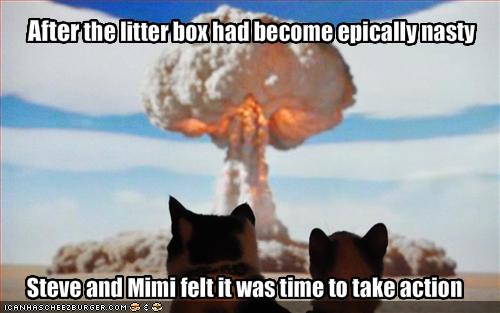
Question 3: Any plans to write the final book to Chains – Forged series?
Answer 3: Yes, yes, a thousand times yes! As soon as this YA is done, I will dive into the final book of the trilogy, called ASHES. I can’t wait.
Question 4: You’ve never seen or met your characters, I assume: what techniques do you use to construct dialogue? How do you translate REALNESS into what they say?
Answer 4: I hear dialog in my head. It is often where my stories start; I’ll be out running or driving and I’ll hear the main character talking. Even though dialog comes easily to me, I find that I revise it countless times. In early drafts I’m often unaware of the nuances of the relationships between characters. As the book comes together, I might realize that a short line of conversation in chapter three sets up the Enormous Plot Twist in chapter 37. Also, my early drafts of dialog always, always, always, contain kitty litter.
“Kitty litter?” you ask, with a polite, nervous smile.
Indeed. Kitty litter. And occasionally turds.
Kitty litter is the stupid fillers that like to gum up a sentence so that the important words get lost. People speak in short, often broken sentences. If your dialog reads like narrative instead of sounding like it could be spoken by living human beings, look for the kitty litter. Cut mercilessly to bring dialog to life.
The turds are clunky bits of backstory that stink up perfectly good dialog. “As you remember from our childhood days at the lake, Jethro, I never learned to swim.” I wind up with dialog turds all the time in early drafts, largely because I need to remind myself of backstory elements. You must go through and remove these horrors when you are revising!
Today’s Quote
“[I start with an emphasis on] character, definitely. And by character I mean a person drawn full-round, not a caricature. E. M. Forster refers to “flat” and “round” characters. I try to make all of mine round. It takes an extrovert like Dickens to make flat characters come alive. But story as such has been neglected by today’s introverted writers. Story and character should grow together; I think I’m lucky so far in that in practically everything I’ve tried to write these two elements have grown together. They must, to give an impression of life being lived, just because each man’s life is a story, if you’ll pardon the cliché.”
William Styron
Today’s Prompt: Eavesdrop in a public place and jot down the bits of conversation that you hear around you. Cafeterias and food courts are good for this. The New York subway is an exceptionally rich spot. The point is not to steal something for your story, or to be arrested. It’s to get you to hear the rhythms of real speech and get a sense for what they look like on the page.
If you have a work in progress, ask a friend to read and record several of the dialog passages for you. Play back the recording and mark what sounds natural and what sounds clunky. Toss out both the turds and kitty litter and start fresh.
Scribble… scribble… scribble…

By: Laurie Halse Anderson,
on 8/12/2012
Blog:
Mad Woman in the Forest
(
Login to Add to MyJacketFlap)
JacketFlap tags:
lha,
Add a tag
Originally published at Mad Woman in the Forest. Please leave any comments there.

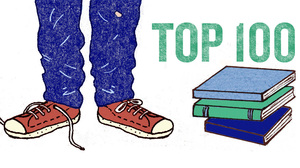
This was a pleasant middle-of-summer surprise! NPR asked listeners to vote for their favorite YA novels of all times, and both SPEAK and WINTERGIRLS made the cut. (SPEAK was #26 and WINTERGIRLS was #99. Given that they only chose the top 100, that one was a little close!)
As lovely an honor as this is, it also made me sad. And angry and frustrated. This just might be the whitest YA list ever. And that is saying something, given that children’s literature is far from diverse. A Minnesota teacher blogged about the issues this raises for all readers. Please take the time to read her post – it is important.
If you are going to browse the NPR list, please also browse through the lists that are linked to over at Reading In Color. Pull all of these lists together and then you’ll have a robust resource for YA readers.
This list was announced almost a week ago and it has taken me this long to process what the honor means to me and what the unbalanced representation means to me, too. You could argue that since the nominations came from NPR’s audience, and that same audience voted for the finalists, that the exclusion of authors of color reflects those voters, and is not any oversight on the part of NPR. The fact that in the commentary, the NPR writers admit they had no idea who John Green was (he has FIVE books on the list and has become a YA force of nature) is another clue that the people involved have a lot to learn about the current state of YA literature.
But then I came across this short announcement, dated 8/2/12: “National Public Radio, criticized in recent years for a lack of diversity of its staff and coverage, is using a $1.5 million grant from the Corporation for Public Broadcasting to put together a six-person team to report stories on race, ethnicity and culture.”
Ya think?
I want to give NPR a thank-you, and also some kudos for at least acknowledging that YA literature is a genre worth paying attention to. But I’d like to challenge them to recognize the bias that they are operating with…. and to fix it. We cannot be a great nation unless and until all of our people are always seated at the table.
Contact the NPR Ombudsman and share your opinion.
Share your opinion with me, too. What do you think about this?

By: Laurie Halse Anderson,
on 8/11/2012
Blog:
Mad Woman in the Forest
(
Login to Add to MyJacketFlap)
JacketFlap tags:
lha,
Add a tag
Originally published at Mad Woman in the Forest. Please leave any comments there.

On Twitter and Facebook I’ve started to take writing-related questions that I’ll answer here. If you have one, feel free to leave it in the Comments section.
Question 1: Please explain your daily routine, how you revise, how you balance professional demands (deadlines etc) with creative/artistic satisfaction.
Answer: I am still looking for the answer!! I got serious about writing in 1992. I had my first book published in 1996. I quit my day job in 2002, and started supporting my family only with income from writing and speaking.
It’s been hard. Way harder than I thought it would be. But maybe that’s good, because it has helped me develop pretty decent work habits.
My daily routine over the years has ebbed and flowed depending on how many kids were living at home, how many parents we were taking care of, whether I was divorced or married, where I lived, and how many weeks/year I was on the road. Right now my routine is fairly simple. I wake up around 5am. Two days a week I spend the morning taking my father to the gym and breakfast, then doing chores and errands for him. The other mornings I try to get out to my writing cottage by 6am. Right now I am working very hard on my new YA, so I write as long as I can, usually until dinner time. I’m bummed because I haven’t had as much time as I’d like for running or gardening this summer, but I really want to get this finished ASAP.
The creative/artistic satisfaction is still there, even though the burden of producing can sometimes feel overwhelming. I wouldn’t be able to work this hard if it were not for the moments of magic, the times when I lost myself in the story and surfaced an hour or four later, without a clear memory of having typed the last ten pages. The satisfaction is enhanced when I get feedback from readers who connect with the story the same way I did when I was writing it.
The revision process? That’s an answer for another day!
Today’s Quote
“Anybody who has survived his childhood has enough information about life to last him the rest of his days.”
― Flannery O’Connor
Today’s Prompt: Write about the time your mother really dressed up. Everything. All the details. All the secrets. All of the dreams and the sadness that you can dredge up.
Scribble… scribble… scribble…



















